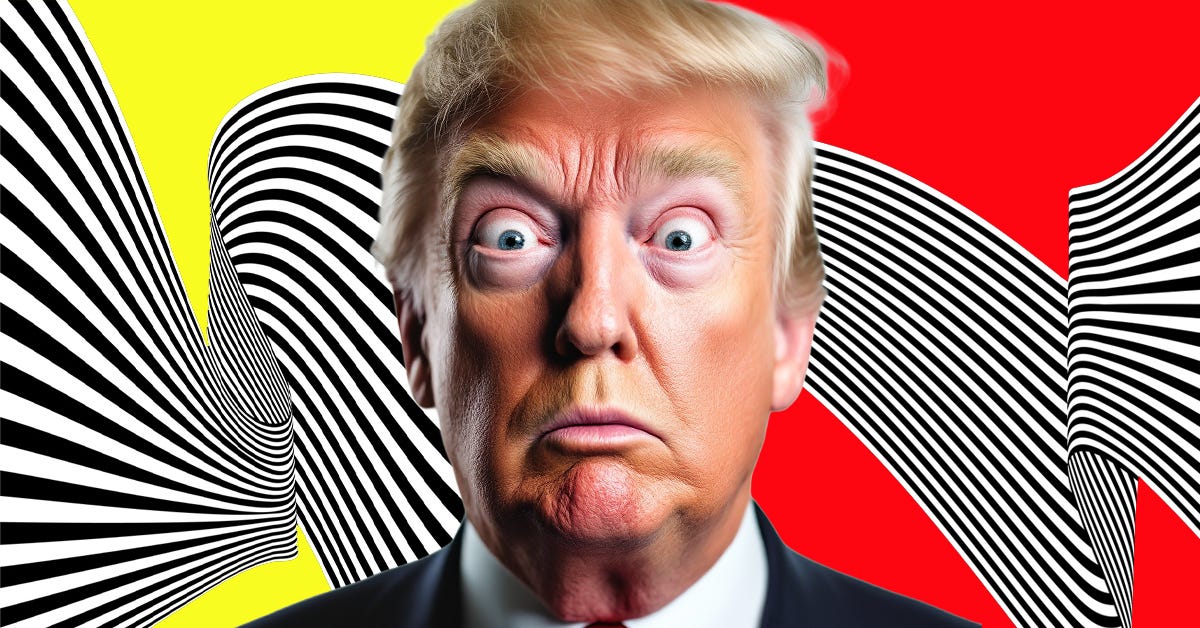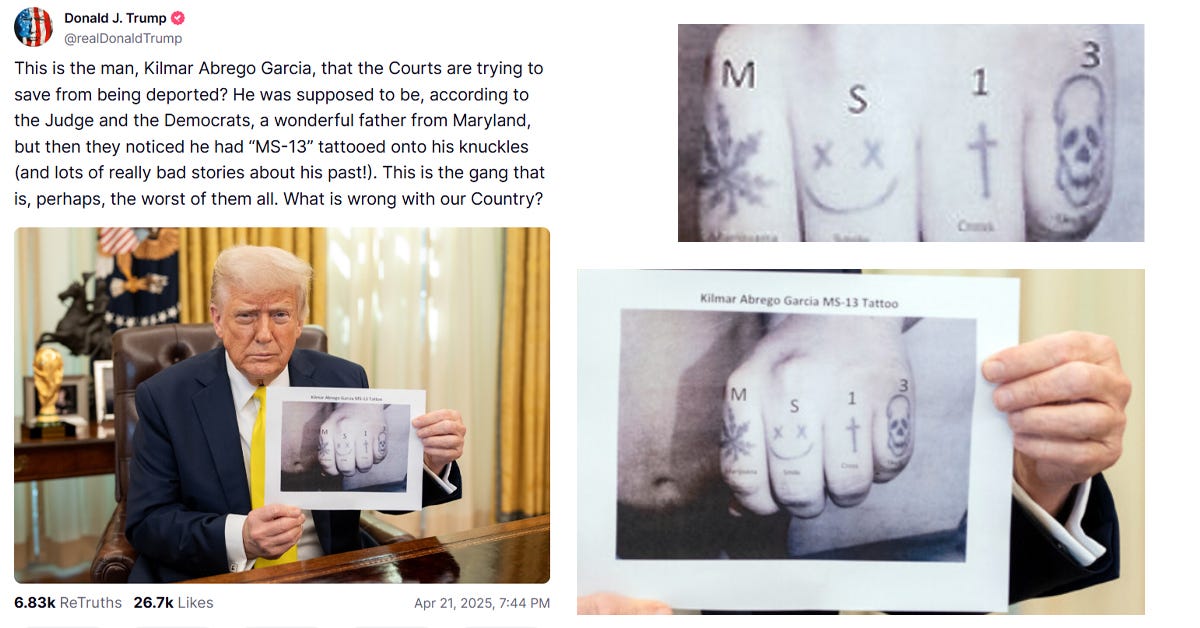Just weeks after my deep dive into the psychological phenomenon known as the Dunning-Kruger Effect and its poster child, Donald Trump, the former president granted ABC News an interview that served as a masterclass in cognitive bias, overconfidence, and stupidity.
The April 29 interview, conducted by Terry Moran in the Oval Office, perfectly illustrated how someone can be simultaneously supremely confident yet astonishingly uninformed.
Related Content:
The Border and Basic Math: A Comedy of Errors
Trump's signature issue remains immigration, where his grasp of statistics continues to astound. When discussing border crossings, Trump confidently declared, "We had many murderers, 11,888, they think. Some murdered more than one person."
This remarkably specific number came with zero context or source, demonstrating the classic Dunning-Kruger trait of making precise claims without evidence.
The MS-13 Tattoo Saga: When Reality Meets Delusion
In a moment that would make Photoshop experts everywhere scratch their heads in disbelief, Trump demonstrated his unique relationship with reality during the ABC News interview.
When confronted about digitally altered images of a deportee's tattoos, Trump not only refused to acknowledge the manipulation but doubled down with the conviction of someone who thinks he can alter reality through sheer force of will.
"On his knuckles, he had MS-13," Trump declared with his trademark certainty, referring to Kilmar Abrego Garcia's hand tattoos.
When ABC's Terry Moran attempted to point out that the letters were digitally added, Trump's response was pure, unfiltered cognitive dissonance:
Wait a minute. Hey, Terry. Terry. Terry. Don't do that — M-S-1-3. It says M-S-1-3.
The Art of Digital Denial
The actual tattoos on Abrego Garcia's hand - a leaf, a smiley face, a cross, and a skull - were apparently not dramatic enough for Team Trump's propaganda machine.
When Moran persisted with the truth, Trump's response perfectly encapsulated his approach to facts that don't align with his preferred narrative:
Why don't you just say, 'Yes, he does,' and, you know, go on to something else.
Even when confronted with photographic evidence showing the absence of MS-13 tattoos in earlier images taken in El Salvador, Trump remained steadfast in his alternative reality.
Meanwhile, a federal judge had already found the evidence linking Abrego Garcia to MS-13 to be "dubious," but why let a little thing like a judicial ruling get in the way of a good story?
This episode serves as yet another sterling example of Trump's unique talent for combining absolute certainty with complete ignorance.
When given the choice to admit the obvious truth about the digital manipulation or to double down on an absurdly false claim, Trump predictably chose the latter. It’s a move that solidifies his status as the ultimate Dunning-Kruger poster child.
Economics According to Trump: Alternative Facts Edition
Perhaps nothing showcases Trump's disconnect from reality quite like his understanding of economics.
With unwavering confidence, he proclaimed, "Gasoline hit $1.98 in a few states during the last couple of days," and "Eggs are down 87% since I got involved."
These claims exist in a parallel universe where fact-checking apparently doesn't exist.
The Tariff Tales
In a particularly memorable exchange about trade policy, Trump insisted, "We have 145% tariffs on China."
When challenged about who actually pays these tariffs, Trump responded with his trademark economic expertise:
You don't know that. You don't know whether or not China's gonna eat it -- China probably will eat those tariffs.
Foreign Policy: A Study in Delusion
Trump's understanding of international relations remains as nuanced as ever. His assessment of the Venezuela situation reached new heights of absurdity when he declared
Do you know Venezuela crime is way down? Way, way down. You know why? Because their criminals are now living happily in the United States of America.
The Putin Paradox
When discussing Ukraine, Trump demonstrated his unique diplomatic approach: "Ukraine was the apple of his [Putin's] eye. He wanted the whole country."
This stunning geopolitical analysis came moments before insisting he alone could have prevented the conflict, showcasing the classic Dunning-Kruger trait of believing complex problems have simple solutions.
The Greatest Hits Collection
No Trump interview would be complete without his greatest hits of self-aggrandizement. "We won all seven swing states. We won the popular vote by a lot," he declared, showing his continued commitment to alternative facts.
When challenged on any point, Trump reverted to his standard response: attacking the interviewer with "I don't trust you. Look at you. You come in all shootin' for bear."
The Final Analysis
Trump continues to demonstrate an inverse relationship between knowledge and confidence, maintaining absolute certainty while making claims that range from questionable to absolutely false.
The tragedy isn't just that Trump doesn't know what he doesn't know - it's that he remains supremely confident in his ignorance.
As the interview progressed, it became increasingly clear that the Dunning-Kruger Effect isn't just a psychological curiosity in Trump's case - it's a governing philosophy.
Freedom doesn’t defend itself. Join a community of readers committed to understanding the critical battles for democracy—and how we can win them.
Stay informed. Stay engaged.







Mark Burnett has a lot to answer for in popularising Donald Trump while hiding his stupidity.
https://lexisantamaria.substack.com/p/exposing-mark-burnett-the-man-who
Everyone should read this post! Unfortunately, that would not likely change anything. These anomalies or revelations about Trump were evident in 2015 and grew even more evident leading up to 2024. Therefore, WHY is one the dumbest human beings on the planet back in the oval office, and what does that say for the majority of our populous who voted for this moron and probably also believe that China will pay their fair share through Tariffs. Or perhaps believe that Trump has an everyman vocabulary and not the obvious undereducated 4th grade dialect that in itself should have precluded this knuckle dragging brainless simpleton from ever holding office again.